 REAL ID Deadline May 7th 2025" width="360" height="170" />
REAL ID Deadline May 7th 2025" width="360" height="170" /> REAL ID Deadline May 7th 2025" width="360" height="170" />
REAL ID Deadline May 7th 2025" width="360" height="170" />
Frequently asked questions and answers regarding the implementation of the REAL ID Act. The REAL ID Act, passed by Congress in 2005, enacted the 9/11 Commission’s recommendation that the Federal Government “set standards for the issuance of sources of identification, such as driver's licenses.” The Act established minimum security standards for license issuance and production and prohibits certain federal agencies from accepting for certain purposes driver’s licenses and identification cards from states not meeting the Act’s minimum standards.
Additional questions may be sent to the Department of Homeland Security at TSA-ContactCenter@tsa.dhs.gov.
Passed by Congress in 2005, the REAL ID Act enacted the 9/11 Commission's recommendation that the Federal Government “set standards for the issuance of sources of identification, such as driver's licenses.” The Act established minimum security standards for state-issued driver's licenses and identification cards and prohibits certain federal agencies from accepting for official purposes licenses and identification cards from states that do not meet these standards. These purposes are:
The enforcement date is May 7, 2025.
Federal agencies, including DHS and TSA, may only accept state-issued driver’s licenses and identification cards as identification for purposes of accessing federal facilities - including TSA airport security checkpoints - if the license or card was issued by a REAL ID compliant state in accordance with the REAL ID security standards (meaning the license or card must include the REAL ID compliant star marking). Enhanced Driver’s Licenses (EDL) issued by Washington, Michigan, Minnesota, New York, and Vermont are considered acceptable alternatives to REAL ID-compliant cards and will also be accepted for official REAL ID purposes. Most EDLs do not contain the star marking and this is acceptable.
Yes. All states, the District of Columbia, and the 5 territories are REAL ID compliant and issuing REAL ID compliant driver’s licenses and IDs.
Visit your state’s driver’s licensing agency website to find out exactly what documentation is required to obtain a REAL ID. At a minimum, you must provide documentation showing: 1) Full Legal Name; 2) Date of Birth; 3) Social Security Number; 4) Two Proofs of Address of Principal Residence; and 5) Lawful Status.
States may impose additional requirements, so check with your state’s driver’s licensing agency website, before visiting them in person, for additional guidance and assistance.
The person may present any of the following documents bearing the applicant's SSN:
REAL ID-compliant cards will have of one of the following markings on the upper top portion of the card. If the card does not have one of these markings, it is not REAL ID-compliant and won’t be accepted as proof of identity in order to board commercial aircraft.

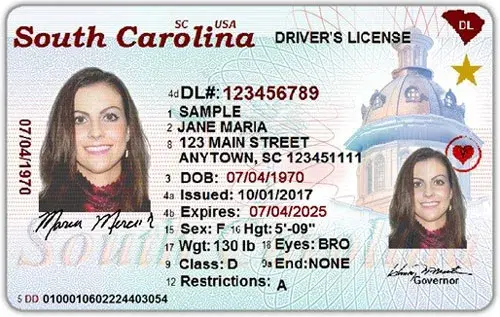
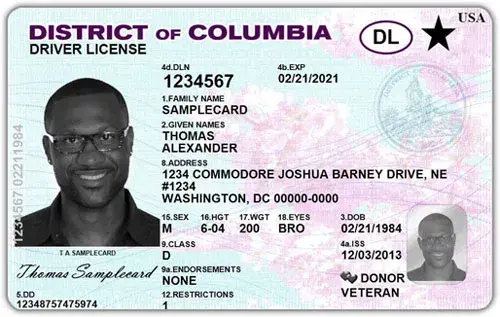
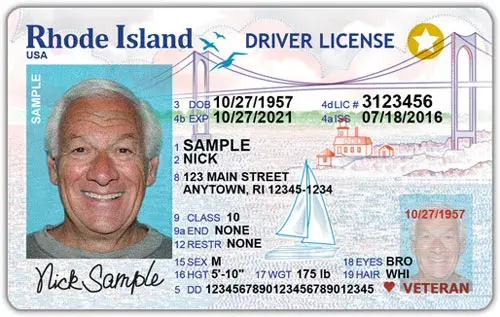
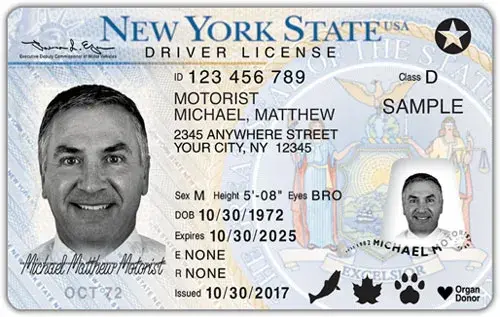
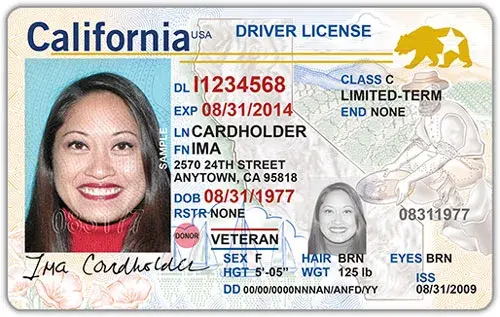
Beginning May 7, 2025 every state and territory resident will need to present a REAL ID compliant license/ID, or another acceptable form of identification, for accessing federal facilities, entering nuclear power plants, and boarding commercial aircraft. The card, itself, must be REAL ID compliant unless the resident is using an alternative acceptable document such as a passport or passport card, or state-issued Enhanced Driver’s License. The Act does not require individuals to present identification where it is not currently required to access a federal facility (such as to enter the public areas of the Smithsonian) nor does it prohibit an agency from accepting other forms of identity documents (such as a U.S. passport or passport card).
No. TSA does not require children under 18 to provide identification when traveling with a companion within the United States. The companion will need acceptable identification.
Travelers who do not present a REAL ID-compliant license or acceptable alternative beginning May 7, 2025 will not be permitted through the security checkpoint.
No. TSA accepts several other forms of identity documents. For more information on acceptable forms of identification for boarding aircraft, please visit TSA’s website at https://www.tsa.gov/travel/security-screening/identification.
Starting May 7, 2025, every state and territory resident will need to present a REAL ID compliant license/ID, or another acceptable form of identification, for accessing federal facilities, entering nuclear power plants, and boarding commercial aircraft. The card, itself, must be REAL ID compliant unless the resident is using an alternative acceptable document such as a passport. The Act does not require individuals to present identification where it is not currently required to access a federal facility (such as to enter the public areas of the Smithsonian) nor does it prohibit an agency from accepting other forms of identity documents (such as a U.S. passport or passport card).
No. REAL ID cards cannot be used for border crossings into Canada, Mexico or other international travel.
No. REAL ID cards cannot be used for international sea cruise travel.
If you are traveling internationally you will still need your passport. If you are traveling domestically, you will only need one valid form of identification – either your REAL ID or another acceptable alternative such as a passport, not both.
Until full enforcement of REAL ID begins on May 7, 2025, DHS and its component agencies, including TSA at its airport security checkpoints, will continue to accept for identification purposes all state-issued driver’s licenses and identification cards issued by compliant states, as well as noncompliant states with a valid extension.
Yes. State-issued Enhanced Driver's Licenses (EDLs) are designated as acceptable border-crossing documents by DHS under the Western Hemisphere Travel Initiative and are acceptable alternatives for official federal purposes such as accessing a federal facility or boarding a commercial aircraft. Individual agency policies may still apply.
Michigan, Minnesota, New York, Vermont, and Washington are the only states that currently issue EDLs. For more information on EDLs, please go to https://www.dhs.gov/enhanced-drivers-licenses-what-are-they.
Federal agencies have the authority to set their own minimum security access requirements and, if desired, decide not to accept noncompliant marked cards before the May 7, 2025 deadline.
For example, The U.S. Department of Defense (DoD) recently finalized an update to its DoD-Wide installation security policy and is in the process of no longer accepting noncompliant marked cards across all of its facilities and installations. However, DoD will continue to accept state-issued noncompliant unmarked "legacy" cards until the May 7, 2025 deadline.
To ensure you have the proper identification, DHS recommends that you contact the federal agency you plan to visit in advance, to obtain information regarding identification requirements.
As a reminder, the REAL ID Act applies when an individual presents a state-issued driver’s license or identification card to a federal agency for an “official purpose” as defined in the Act and regulations, such as boarding a federally regulated commercial aircraft. Although a REAL ID card may not be necessary for other purposes such as driving, voting, banking, or applying for benefits or employment, we recommend checking with the relevant state, local, or commercial entities regarding their specific identification requirements.
No. REAL ID is a national set of standards, not a national identification card. REAL ID does not create a federal database of driver license information. Each jurisdiction continues to issue its own unique license, maintains its own records, and controls who gets access to those records and under what circumstances. The purpose of REAL ID is to make our identity documents more consistent and secure.
REAL ID allows compliant states to issue driver's licenses and identification cards where the identity of the applicant cannot be assured or for whom lawful presence is not determined. In fact, some states currently issue noncompliant cards to undocumented individuals. Noncompliant cards must clearly state on their face (and in the machine readable zone) that they are not acceptable for REAL ID purposes and must use a unique design or color to differentiate them from compliant cards. DHS cautions against assuming that possession of a noncompliant card indicates the holder is an undocumented individual, given that individuals may obtain noncompliant cards for many reasons unrelated to lawful presence. Possession of a noncompliant card does not indicate that the holder is an undocumented individual, given that individuals may obtain noncompliant cards for many reasons unrelated to lawful presence.
The REAL ID Act allows states to issue temporary (i.e., limited-term), REAL ID-compliant driver's licenses and ID cards to applicants who provide valid, documentary evidence that they have “approved deferred action status.” [Sec. 202(c)(2)(B)(viii)] Under the REAL ID regulation, applicants with approved deferred action who hold valid Employment Authorization Documents (EADs) and Social Security Numbers (SSNs) may qualify to receive temporary REAL ID driver's licenses and ID cards. The Deferred Action for Childhood Arrival (DACA) Program standardized and expedited the process for obtaining these supporting identification documents for individuals with Deferred Action seeking REAL IDs. Individuals with approved Deferred Action, valid EADs and valid SSNs may continue to hold temporary (limited-term) REAL IDs until their expiration. In any case, REAL ID compliant states may continue to issue noncompliant licenses and IDs to individuals with or without lawful status, including deferred action, as defined under the REAL ID Act.
Yes, a TPS beneficiary or individual with a pending TPS application can obtain a REAL ID compliant license or identification card. The Secretary of Homeland Security may designate a foreign country for TPS due to conditions in the country that temporarily prevent the country's nationals from returning safely, or in certain circumstances, where the country is unable to handle the return of its nationals adequately. USCIS may grant TPS to eligible nationals of certain designated countries (or parts of countries), who are already in the United States. Eligible individuals without nationality who last habitually resided in the designated country may also be granted TPS.
The validity period of the license or ID card generally depends upon the length of the TPS period. When DHS initially designates TPS status for a country, it can do so for a minimum of 6 months but no more than 18 months. TPS extensions provided after the initial designation are for a period of 6, 12, or 18 months. Designations and extensions are provided through a Federal Register Notice. A TPS beneficiary’s status is tied to a country designated for TPS. Pursuant to Section 202(c)(2)(C)(ii) of the Real ID Act of 2005, a temporary driver's license or temporary identification card issued to individuals who have a pending or approved application for TPS “shall be valid only during the period of time of the applicant's authorized stay in the United States or, if there is no definite end to the period of authorized stay, a period of one year.”
On December 17, 2018, President Trump signed the REAL ID Act Modification for Freely Associated States Act, Public Law 115-323. This Act amends the REAL ID Act of 2005 to authorize states to issue full-term REAL ID compliant driver’s licenses and identification cards to citizens of the Federated States of Micronesia, the Republic of Palau, and the Republic of the Marshall Islands (collectively known as the Freely Associated States, or FAS) who have been admitted to the United States as nonimmigrants pursuant to a Compact of Free Association and who meet the identification requirements of the REAL ID Act.
The REAL ID Act Modification for Freely Associated States Act amends the REAL ID Act to separate citizens of the Freely Associated States from the categories of non-U.S. citizens who are only eligible to receive a temporary (limited term) REAL ID- compliant driver’s license or identification card with a validity period no longer than the period of authorized stay in the United States, or if there is no definite end to the period of authorized stay, one year. With this amendment, citizens of the Freely Associated States who present acceptable evidence of identity and lawful status under the REAL ID Act and its implementing regulations should now receive a full-term driver’s license or identification card, rather than a temporary one.
DHS recently designated an unexpired foreign passport with an approved I-94, with a valid visa no longer required, documenting the applicant’s most recent admission to the United States under a Compact, as acceptable documents FAS citizens may present to establish identity in order to obtain a REAL ID license or identification card. FAS citizens also may present one of the other identity documents listed in the regulations, including an unexpired passport, with a valid, unexpired visa (if applicable), and approved I-94, an unexpired employment authorization document, or a previously issued REAL ID compliant driver’s license or identification card (in which case, a valid passport and I-94 is acceptable evidence of lawful status). In all cases, the documentation presented for proof of identity and lawful status must be verified through Systematic Alien Verification for Entitlements (SAVE).
Freely Associated States citizens who entered the United States lawfully years ago may have passports that have expired. In order to be issued a REAL ID-compliant document, they will need to renew their passport or present another acceptable identity document, such as an unexpired EAD.
The appropriate validity period of the driver’s license or identification card will be consistent with the state’s regular expiration period for full-term REAL ID-compliant documents and carry the same compliant markings without any additional language.
The designation of the unexpired passport with an approved I-94 as an acceptable identity document is only available to Freely Associated States citizens admitted under the Compacts. This designation does not change the requirement for other classes of nonimmigrants to present a valid unexpired passport, valid unexpired visa, and I-94; or an EAD as evidence of identity and lawful status. In all cases, the documentation presented for proof of identity and lawful status must be verified through Systematic Alien Verification for Entitlements (SAVE).
The REAL ID Act Modification for Freely Associated States Act only applies to citizens of the Freely Associated States and enables them to receive full-term REAL ID licenses. Other categories of non-U.S. citizens in a “temporary lawful status” as defined in the REAL ID regulations remain eligible for temporary (limited term) REAL ID-compliant driver’s license or identification card with a validity period no longer than the period of authorized stay in the United States, or if there is no definite end to the period of authorized stay, one year. These categories of individuals in a “temporary lawful status” as defined in the REAL ID regulations include a person who is a nonimmigrant; has a pending application for asylum; has a pending or approved application for temporary protected status; has approved deferred action; or has a pending application for lawful permanent resident or conditional permanent resident status.
No. The REAL ID regulatory standards for the digital photograph recognize that some individuals may wear head coverings for religious or other reasons. However, such coverings should not obscure an applicant’s facial features or generate a shadow. For purposes of the photograph, the face should be visible from the hairline to the chin and forward of the ears, and be free of shadows. The REAL ID regulation does not require the exposure of the hair line or the ears.
Yes. REAL ID allows jurisdictions to issue identification cards and driver’s licenses that are not in compliance with the requirements of the Act. Those licenses and identification cards, however, must clearly state on their face and in the machine readable zone that the card is not acceptable for official purposes.
State Enhanced Driver’s Licenses (EDL) designated as acceptable border-crossing documents by DHS under the Western Hemisphere Travel Initiative (WHTI) are acceptable for official federal purposes (i.e., boarding a commercial aircraft, accessing a federal facility, or entering a nuclear power plant). However the existence of an EDL is not sufficient to consider the state to be in overall compliance for purpose of determining whether a federal agency may accept a state’s regular driver’s license for official purposes. For example, a federal agency could accept an EDL issued from a state but not be able to accept a standard driver’s license from that same state.
DHS makes determinations that a state is meeting the minimum requirements of the REAL ID Act based upon certifications submitted by the state to the Secretary of Homeland Security. The REAL ID regulation prescribes how these certifications are to be made. In particular, the REAL ID regulation requires that states recertify their compliance with the Act every three years, on a rolling basis, as determined by DHS.
On November 7, 2019, DHS issued a request for information (RFI), published in the Federal Register, to receive input on technologies that could assist states and their residents in the digital submission, receipt, and authentication of documents and information applicants must provide when applying for a REAL ID compliant driver’s license or identification card. DHS received 69 responsive comments and completed its preliminary review of the responsive proposals. Based on this review, DHS has identified one viable option that can be immediately implemented by the states, territories, and District of Columbia, hereafter “States,” consistent with existing authorities.
On February 19, 2020, DHS informed the States that effective immediately, they are permitted to implement the acceptance of electronically submitted copies of source documents with certain restrictions. Specifically, the States may now add the pre-submission of identity and lawful status source documents, through a secure electronic process, prior to an applicant’s in-person DMV visit, and physical presentation of those same documents for authentication and verification by DMV personnel.
States had requested this ability during the RFI process stating that electronic pre-submission helps streamline the application process by: 1) ensuring that an applicant has the correct information and, 2) allowing a state to electronically retain that information prior to the applicant’s in-person visit. Retaining the information in advance eliminates time-consuming activities associated with the physical scanning and retention of source documents that typically occurs during the applicant’s DMV visit. States informed DHS that this can have a direct impact on reducing overall applicant wait times and improving customer satisfaction. DHS guidance to the States recommend that they consider implementing this option.
DHS continues to evaluate the other proposals for action and is working with the Office of Management and Budget and Congress, as necessary.